
TABLE OF CONTENTS
There are many activities and ideas collected in this project. As I attempted to reference the resources, in some cases it became difficult to determine who, when, and where I was introduced to each activity. Wherever possible, I have provided a reference for the source of the activity. There are many activities that I have designed and many that I was introduced to somewhere along my counseling path by someone who designed it or adapted it. I want to acknowledge all of those creative counselors that have come before me and extend my appreciation. All of these activities have been adapted and fit into a standards-based format with the primary purpose to improve the academic, career, and personal/social development of all students within the context of a guidance curriculum.
I would like to thank Corinne Antone for her many hours of editing and formatting as well as for putting up with an author in the family. Second, I would like to thank all of the fine school counselors and students who I have had the honor of knowing or working with over the years. And last, I would like to thank all of the school counseling graduate students who have taught me much about both teaching and learning. I am proud to be a school counselor and a school counselor educator. We accept the challenge of enhancing the lives of young peoplethis is work worthy of considerable effort.
Mark D. Nelson is co-owner of Hyalite, LLC, a training and professional development company for counselors. In addition, he is a Professor and Program Leader for the School Counseling Program in the Department of Health and Human Development at Montana State University. Dr. Nelson began his career as a school counselor working with traditional and alternative education programs. He learned much from students regarding the notions of student success and student development. He has designed and implemented several school counseling programs and guidance curriculum activities for a number of schools. Eventually, Dr. Nelson became a school counselor educator at Montana State University. He teaches and publishes in the areas of group counseling, counseling children and adolescents, adventure counseling, and school counseling. His research interests include Adlerian counseling theory and practice, adventure counseling, supervision, and school counseling.
School counselors are motivated, caring, and responsive professionals whose primary objective is to enhance student development in their schools. Childhood and adolescence are not simply a time of innocence and growing up, but a time when young people must address and master a myriad of tasks, such as
 acquiring fundamental academic skills;
acquiring fundamental academic skills;
 developing a future-oriented focus and an awareness of and readiness for higher education and the world of work;
developing a future-oriented focus and an awareness of and readiness for higher education and the world of work;
 building a positive self-concept and an awareness of their abilities, aptitudes, interests, and limitations; and
building a positive self-concept and an awareness of their abilities, aptitudes, interests, and limitations; and
 learning to get along with their peers while becoming aware and tolerant of individual and group differences.
learning to get along with their peers while becoming aware and tolerant of individual and group differences.
As counselors in a school setting, it is essential that our work becomes integrated into the educational mission of our schools. We want our students to be successful young people who will find their place in the world, both during their school years and afterwards. One means of organizing our efforts is to shape our work within the framework of a school counseling program. A school counseling program is centered on the belief that education provides a series of meaningful learning experiences that serve to prepare our youth to survive, thrive, and succeed in an exciting, challenging, and changing world.
The American School Counselor Association (ASCA, 2003) has published a model for school counseling programs which consists of four interrelated program components: Foundation, Delivery System, Management System, and Accountability System. The Foundation includes the program philosophy, mission, and the standards upon which the three systems interact. A Delivery System describes the activities, interactions, and methods to deliver the program. A Management System outlines processes and tolls necessary to effectively manage the program. Finally, an Accountability System evaluates the program and its outcomes.
The Delivery System characterizes how school counselors deliver the program throughout their school. Based on the philosophy, mission, and standards identified in the Foundation, the Delivery System describes the methods of implementing the program and involves teaching classroom lessons (Guidance Curriculum), planning and setting goals with students (Student Planning), counseling with individuals and groups (Responsive Services), and managing the program (System Support).
A Guidance Curriculum consists of structured lessons or learning experiences that are presented systematically through classroom and small group activities. The purpose of the Guidance Curriculum is to enhance student development by promoting academic, career, and personal/social development for all students. When school counselors teach from a developmentally appropriate curriculum, students will learn and demonstrate the life skills that will assist them as they navigate their path into a world of higher education, work, and interpersonal relationships. More than anyone else in the school building, school counselors are trained in child and adolescent development. In order to be effective, a school counseling program really must be both comprehensive (addresses the needs and opportunities for ALL students) and developmentally sequenced (organized to be appropriate based upon the cognitive, affective, and behavioral abilities of the respective students).
School Counseling Program Structure
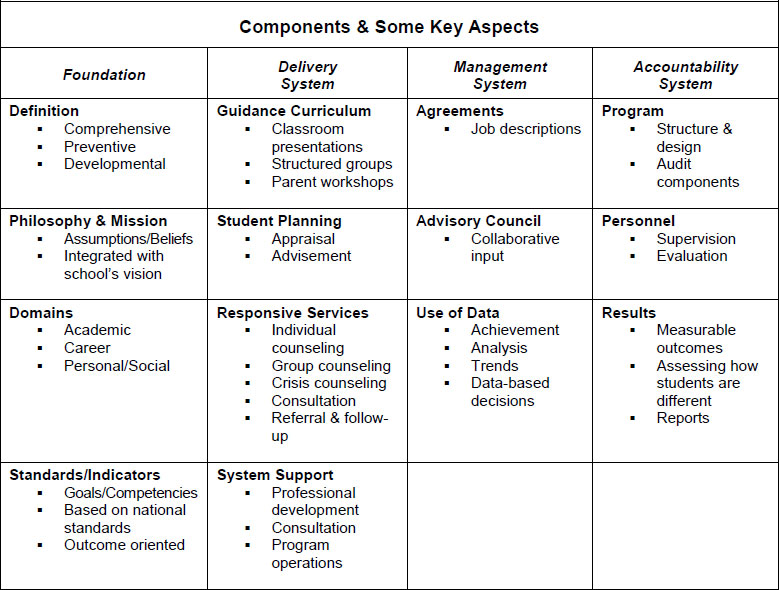
Concept and Design of The School Counselors Guide
The School Counselors Guide is designed and written with the intention to enhance student development through the facilitation of classroom activities. Activities in The School Counselors Guide are comprehensive and developmentally sequenced. Perhaps most important and useful is that The School Counselors Guide activities are designed and organized to meet national standards developed by ASCA. In addition, unlike other curricula materials, The School Counselors Guide includes assessment instruments as a means to measure the outcomes of implementing a Guidance Curriculum. Finally, school counselors can determine the extent to which they are making a difference for their students. Rather than explaining what school counselors do, with The School Counselors Guide you can demonstrate with data how students are different as a result of implementing your Guidance Curriculum. These data provide clear evidence that school counseling programs are accountable and responsive to the needs of students.
School counselors have been going into classrooms and facilitating classroom guidance lessons since the inception of our profession. Over time, curricular themes have evolved and concentrated on various competencies or skills for young people related to achievement, planning for eventual career choice, and interpersonal skills. By implementing a Guidance Curriculum that is comprehensive, developmental, and based on standards and outcomes, school counselors can
Next page
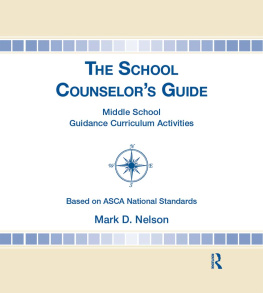

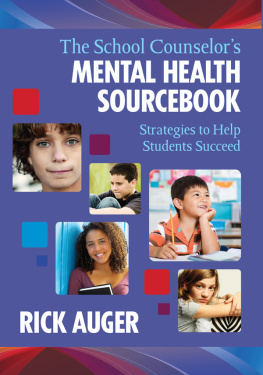
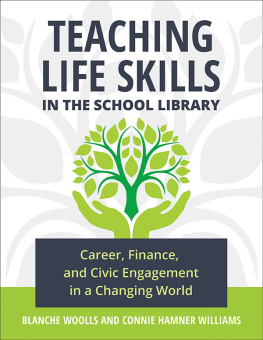

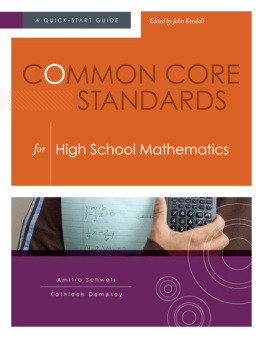

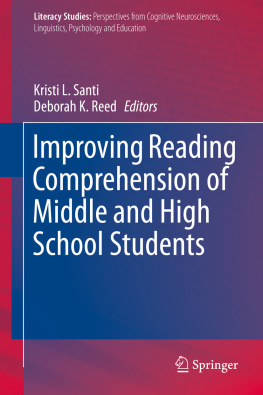
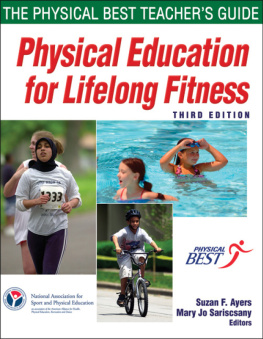

 acquiring fundamental academic skills;
acquiring fundamental academic skills;